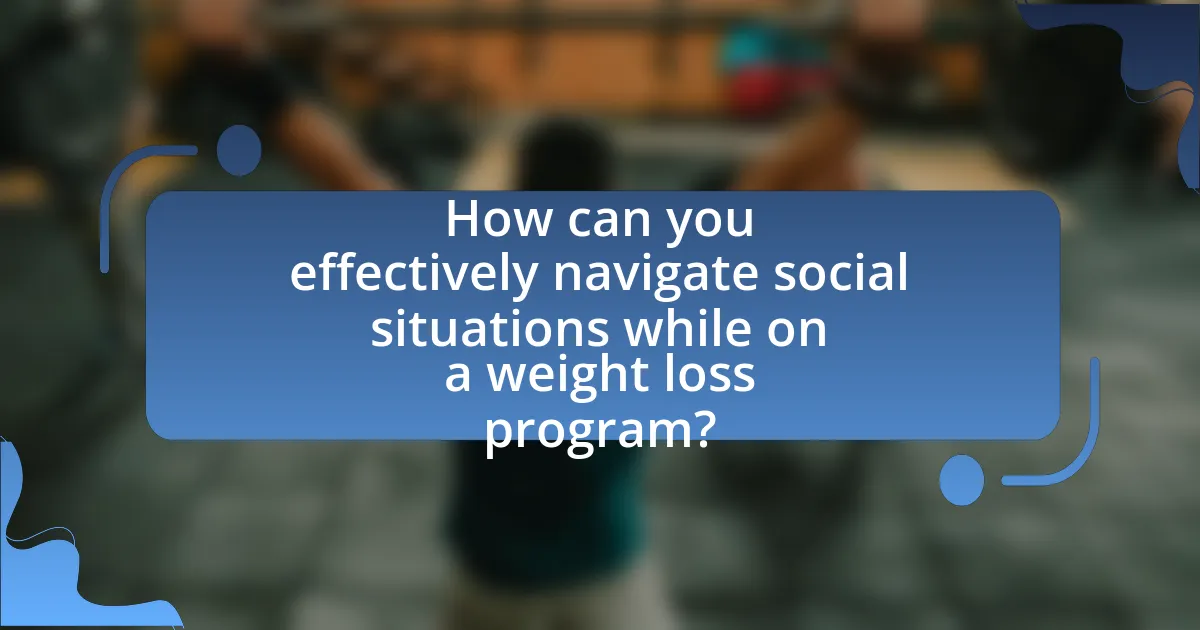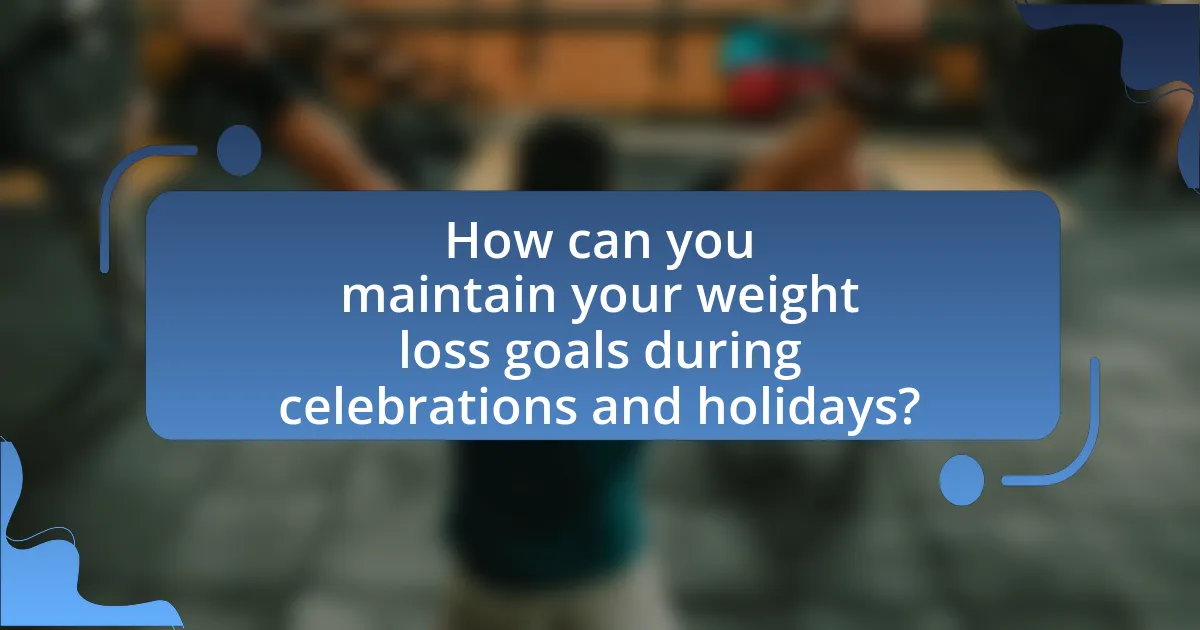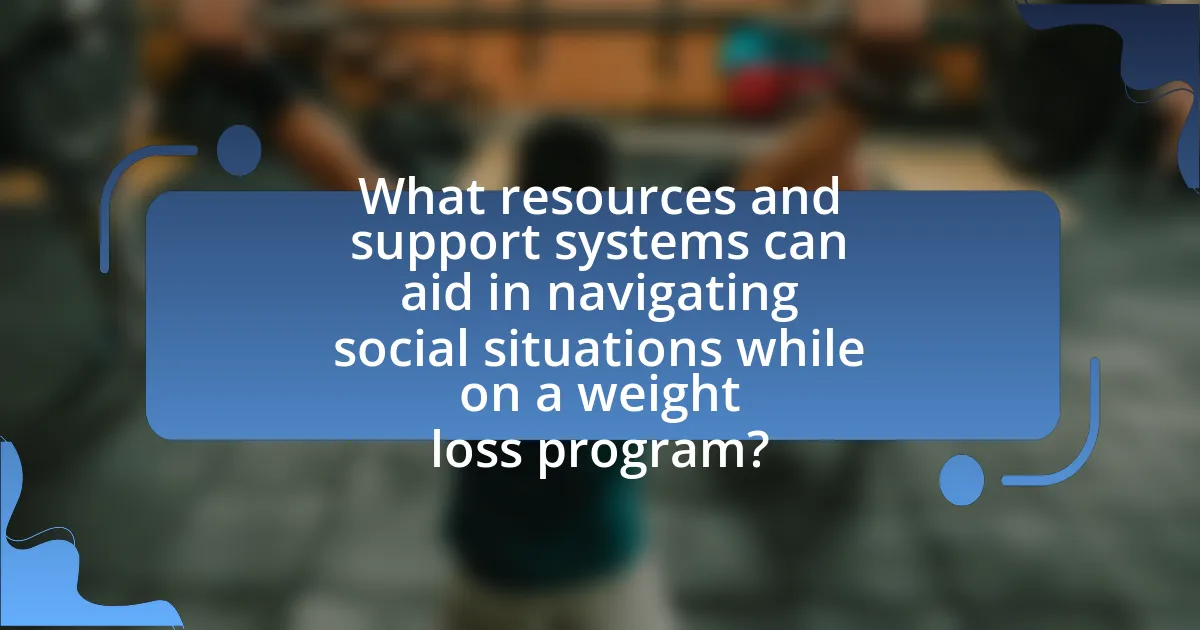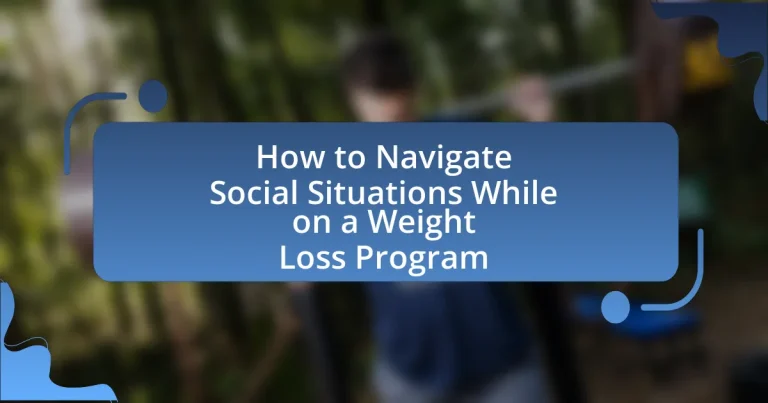The article focuses on strategies for effectively navigating social situations while on a weight loss program. It highlights the importance of planning ahead, such as reviewing menus and selecting healthier options, to avoid impulsive eating. Key challenges faced include peer pressure, social anxiety, and the temptation of unhealthy food choices, which can undermine dietary goals. The article also discusses the role of social support, effective coping mechanisms, and communication with friends and family in maintaining weight loss objectives. Practical tips for meal planning, portion control, and mindfulness techniques are provided to help individuals stay committed during social gatherings and celebrations.

How can you effectively navigate social situations while on a weight loss program?
To effectively navigate social situations while on a weight loss program, individuals should plan ahead by reviewing menus in advance and choosing healthier options. Research indicates that pre-selecting meals can lead to better dietary choices, as it reduces impulsive eating behaviors often triggered by social settings. Additionally, communicating dietary goals with friends and family can foster support and understanding, making it easier to stick to the program. Studies show that social support significantly enhances weight loss success, as individuals feel more accountable and motivated when their goals are known.
What challenges do individuals face in social settings during a weight loss journey?
Individuals face several challenges in social settings during a weight loss journey, including peer pressure, social anxiety, and the availability of unhealthy food options. Peer pressure can lead to feelings of inadequacy when others indulge in high-calorie foods, making it difficult for individuals to stick to their dietary goals. Social anxiety may arise from the fear of judgment or scrutiny regarding their food choices, which can deter them from participating in social gatherings. Additionally, the prevalence of unhealthy food options at events can create temptation, complicating adherence to a weight loss plan. These challenges are supported by research indicating that social environments significantly influence eating behaviors and weight management outcomes.
How do peer pressures impact dietary choices in social situations?
Peer pressures significantly influence dietary choices in social situations by encouraging individuals to conform to group norms regarding food consumption. Research indicates that people often modify their eating behaviors to align with those of their peers, which can lead to increased intake of unhealthy foods or larger portion sizes. A study published in the journal “Appetite” found that individuals are more likely to choose high-calorie foods when dining with friends compared to when eating alone, highlighting the impact of social dynamics on food choices. This tendency to yield to peer influence can undermine personal dietary goals, particularly for those on weight loss programs.
What role does social anxiety play in maintaining a weight loss program?
Social anxiety significantly hinders the maintenance of a weight loss program by creating barriers to social interactions that are crucial for support and accountability. Individuals with social anxiety may avoid social gatherings where food is present, leading to isolation and reduced motivation to adhere to their weight loss goals. Research indicates that social support is a key factor in successful weight management; for instance, a study published in the journal “Obesity” found that individuals who engage in group weight loss programs experience greater success due to shared encouragement and accountability. Therefore, social anxiety can undermine the benefits of social support, making it more challenging to sustain a weight loss program effectively.
How can you prepare for social events while on a weight loss program?
To prepare for social events while on a weight loss program, individuals should plan their meals and snacks in advance. This proactive approach allows them to make healthier choices and avoid impulsive eating. Research indicates that pre-planning meals can lead to better adherence to dietary goals, as it reduces the likelihood of consuming high-calorie foods typically available at social gatherings. Additionally, individuals can communicate their dietary preferences to hosts, which may encourage healthier options to be provided. Engaging in physical activity before the event can also help offset calorie intake, making it easier to enjoy the occasion without derailing weight loss efforts.
What strategies can help you plan meals ahead of time?
To effectively plan meals ahead of time, individuals can utilize strategies such as meal prepping, creating a weekly menu, and using grocery lists. Meal prepping involves preparing and portioning meals in advance, which can save time and ensure healthier choices. Creating a weekly menu helps in organizing meals and snacks, allowing for balanced nutrition and reducing last-minute unhealthy food decisions. Utilizing grocery lists based on the planned menu ensures that all necessary ingredients are purchased, minimizing food waste and promoting adherence to dietary goals. These strategies are supported by research indicating that meal planning can lead to healthier eating patterns and improved dietary adherence, as noted in studies published in the Journal of Nutrition Education and Behavior.
How can you communicate your dietary needs to friends and family?
To communicate your dietary needs to friends and family, clearly express your requirements and preferences in a straightforward manner. For instance, you can initiate a conversation by stating, “I am following a specific diet that requires me to avoid certain foods like gluten or sugar.” This direct approach helps others understand your needs without ambiguity. Research indicates that open communication fosters support and understanding in social settings, which is crucial for maintaining dietary goals during weight loss programs.
What are effective coping mechanisms for social gatherings?
Effective coping mechanisms for social gatherings include setting clear personal goals, practicing mindfulness, and preparing responses to social pressures. Setting clear personal goals helps individuals stay focused on their weight loss objectives, allowing them to make healthier choices during events. Mindfulness techniques, such as deep breathing or visualization, can reduce anxiety and enhance self-awareness, making it easier to navigate social interactions. Additionally, preparing responses to common social pressures, like offers of unhealthy food or drinks, empowers individuals to assert their choices confidently. Research indicates that individuals who employ these strategies are more likely to maintain their weight loss goals in social settings, as they create a supportive framework for decision-making.
How can you handle food pushers at social events?
To handle food pushers at social events, assertively communicate your dietary choices and preferences. When someone offers food, politely decline by stating that you are following a specific eating plan or simply not hungry. Research indicates that clear communication can reduce pressure from others, as people often respect boundaries when they are clearly expressed. Additionally, preparing a response in advance can help you feel more confident in these situations, reinforcing your commitment to your weight loss program.
What alternatives can you suggest when dining out with friends?
When dining out with friends while on a weight loss program, consider alternatives such as choosing restaurants with healthy menu options, sharing dishes to control portion sizes, or opting for meals that are grilled or steamed instead of fried. Research indicates that selecting meals with lean proteins and plenty of vegetables can significantly aid in weight management. For instance, a study published in the Journal of Nutrition found that individuals who consumed more vegetables and lean proteins experienced better weight loss outcomes. Additionally, suggesting a place that offers customizable meals allows for better control over ingredients and portion sizes, further supporting weight loss goals.

How can you maintain your weight loss goals during celebrations and holidays?
To maintain weight loss goals during celebrations and holidays, individuals should plan ahead by setting specific limits on food and drink intake. Research indicates that pre-planning meals and snacks can help manage caloric intake, as individuals who set boundaries are more likely to adhere to their weight loss objectives. Additionally, choosing healthier options at gatherings, such as fruits and vegetables, can support weight management while still allowing participation in festive activities. Studies show that mindful eating practices, such as savoring each bite and eating slowly, can also prevent overeating during these occasions.
What are the best practices for enjoying holiday meals without overindulging?
To enjoy holiday meals without overindulging, practice portion control by using smaller plates and serving sizes. Research indicates that people tend to eat less when they use smaller dishes, as it visually appears to be a full meal, leading to reduced calorie intake. Additionally, prioritize high-fiber foods like vegetables and whole grains, which promote satiety and help manage hunger. Studies show that fiber-rich meals can lead to lower overall calorie consumption. Lastly, stay mindful while eating by savoring each bite and minimizing distractions, which has been linked to better awareness of hunger cues and reduced overeating.
How can portion control help during festive gatherings?
Portion control can help during festive gatherings by allowing individuals to enjoy a variety of foods without overeating. By serving smaller portions, individuals can savor the flavors and textures of festive dishes while managing their caloric intake. Research indicates that people tend to consume less when they are mindful of portion sizes; for example, a study published in the American Journal of Clinical Nutrition found that participants who used smaller plates consumed 30% fewer calories compared to those with larger plates. This approach not only supports weight loss goals but also promotes a balanced enjoyment of the festive experience.
What healthy alternatives can you bring to potlucks or parties?
Healthy alternatives to bring to potlucks or parties include vegetable platters with hummus, fruit skewers, quinoa salad, and whole grain wraps. These options provide essential nutrients while being lower in calories compared to traditional party foods. For instance, a vegetable platter with hummus offers fiber and healthy fats, making it a satisfying choice. Quinoa salad is rich in protein and can be customized with various vegetables, enhancing its nutritional value. Whole grain wraps can be filled with lean proteins and fresh veggies, providing a balanced meal option. These alternatives not only support weight loss goals but also cater to diverse dietary preferences, making them suitable for various guests.
How can you stay motivated during social events that revolve around food?
To stay motivated during social events that revolve around food, set clear personal goals and remind yourself of your commitment to a weight loss program. Establishing specific objectives, such as limiting portion sizes or choosing healthier options, reinforces your determination. Research indicates that individuals who set clear goals are more likely to succeed in maintaining healthy behaviors in social settings. For example, a study published in the Journal of Nutrition Education and Behavior found that goal-setting significantly improved dietary choices among participants at social gatherings. By focusing on your goals and making conscious choices, you can navigate food-centric events while staying aligned with your weight loss objectives.
What mindset shifts can help you enjoy socializing without compromising your goals?
To enjoy socializing without compromising weight loss goals, adopt a mindset that prioritizes balance and intentionality. This involves viewing social events as opportunities for connection rather than solely focusing on food choices. By setting clear intentions before attending gatherings, individuals can make mindful decisions that align with their goals, such as choosing healthier options or moderating portions. Research indicates that individuals who practice mindful eating are more successful in maintaining weight loss, as they develop a greater awareness of their food choices and hunger cues. This shift in perspective allows for enjoyment of social interactions while still adhering to personal health objectives.
How can setting personal boundaries enhance your experience at social gatherings?
Setting personal boundaries enhances your experience at social gatherings by allowing you to maintain control over your choices and interactions. When individuals establish clear limits regarding food, drink, and social engagement, they can better resist peer pressure and make healthier decisions aligned with their weight loss goals. Research indicates that people who set boundaries are more likely to stick to their dietary plans, as they feel empowered and less anxious in social settings. For instance, a study published in the Journal of Health Psychology found that individuals who practiced assertiveness in social situations reported higher satisfaction and adherence to their health goals. Thus, setting personal boundaries not only fosters a sense of autonomy but also contributes to a more positive and fulfilling experience at social gatherings.

What resources and support systems can aid in navigating social situations while on a weight loss program?
Support groups and online communities are essential resources for navigating social situations during a weight loss program. These platforms provide emotional support, accountability, and shared experiences, which can help individuals feel less isolated. Research indicates that social support significantly enhances weight loss success; for instance, a study published in the journal “Obesity” found that participants who engaged in group support lost more weight than those who did not. Additionally, mobile apps designed for weight loss can offer meal tracking, social networking features, and tips for managing social eating scenarios, further aiding individuals in maintaining their goals while interacting with others.
How can joining a support group benefit your weight loss journey?
Joining a support group can significantly enhance your weight loss journey by providing accountability, motivation, and emotional support. Research indicates that individuals who participate in support groups are more likely to achieve their weight loss goals compared to those who do not. For instance, a study published in the journal “Obesity” found that participants in a structured weight loss support group lost an average of 10% of their body weight over six months, while those without support lost only 3%. This demonstrates that the shared experiences and encouragement from group members can lead to better adherence to weight loss plans and healthier lifestyle choices.
What types of support groups are available for individuals on weight loss programs?
Support groups for individuals on weight loss programs include peer-led groups, professional-led groups, online forums, and community-based organizations. Peer-led groups, such as Weight Watchers, provide a platform for sharing experiences and accountability among members. Professional-led groups often involve nutritionists or therapists who offer guidance and support tailored to individual needs. Online forums, like those found on social media platforms or dedicated weight loss websites, allow for flexible participation and access to a wider community. Community-based organizations may offer local meetings and resources, fostering a sense of belonging and support in the weight loss journey. These various types of support groups enhance motivation and provide emotional support, which is crucial for successful weight management.
How can online communities provide encouragement and accountability?
Online communities provide encouragement and accountability by fostering a supportive environment where members share their goals, progress, and challenges. This interaction creates a sense of belonging and motivates individuals to stay committed to their weight loss programs. Research indicates that social support significantly enhances adherence to health-related behaviors; for instance, a study published in the Journal of Medical Internet Research found that participants in online weight loss communities reported higher levels of motivation and accountability compared to those who did not engage in such platforms. Additionally, regular check-ins and progress updates within these communities help individuals track their achievements and receive constructive feedback, reinforcing their commitment to their goals.
What role does professional guidance play in managing social situations?
Professional guidance plays a crucial role in managing social situations, particularly for individuals on a weight loss program. This guidance helps individuals develop effective strategies to navigate social interactions that may involve food-related challenges, such as dining out or attending gatherings. Research indicates that support from professionals, such as dietitians or therapists, can enhance adherence to weight loss goals by providing tailored advice and coping mechanisms for social pressures. For instance, a study published in the Journal of Nutrition Education and Behavior found that participants who received professional support reported higher confidence in managing social situations and were more successful in maintaining their weight loss compared to those who did not receive such guidance.
How can a nutritionist help you create a balanced approach to social eating?
A nutritionist can help you create a balanced approach to social eating by providing personalized strategies that align with your dietary goals while allowing for social enjoyment. They assess your individual nutritional needs and preferences, helping you identify healthier options in social settings without feeling deprived. For example, a nutritionist may suggest portion control techniques or the inclusion of nutrient-dense foods at gatherings, which can facilitate mindful eating. Research indicates that structured dietary guidance can improve adherence to weight loss programs, as seen in studies published in the Journal of the Academy of Nutrition and Dietetics, where participants reported greater satisfaction and success in social eating scenarios when supported by a nutrition professional.
What benefits can a therapist offer in addressing emotional eating triggers?
A therapist can provide significant benefits in addressing emotional eating triggers by helping individuals identify and understand the underlying emotions that lead to such behaviors. Through techniques like cognitive-behavioral therapy, therapists can assist clients in recognizing patterns of emotional eating and developing healthier coping strategies. Research indicates that therapy can lead to a reduction in emotional eating behaviors, as evidenced by a study published in the Journal of Consulting and Clinical Psychology, which found that participants who engaged in therapy reported decreased emotional eating and improved emotional regulation. This therapeutic support not only aids in managing emotional triggers but also fosters a more mindful approach to eating, ultimately contributing to successful weight loss and healthier lifestyle choices.
What practical tips can help you successfully navigate social situations while on a weight loss program?
To successfully navigate social situations while on a weight loss program, plan ahead by reviewing menus in advance and choosing healthier options. This proactive approach allows individuals to make informed decisions that align with their dietary goals. Additionally, practicing portion control by sharing dishes or opting for smaller servings can help manage calorie intake without feeling deprived. Research indicates that social support plays a crucial role in weight loss success; therefore, communicating your goals to friends and family can foster understanding and encouragement. Lastly, staying mindful during social events by focusing on conversations rather than food can help maintain a healthy mindset and reduce the temptation to overeat.
How can mindfulness techniques improve your experience at social events?
Mindfulness techniques can significantly enhance your experience at social events by promoting present-moment awareness and reducing anxiety. By practicing mindfulness, individuals can focus on their immediate surroundings and interactions, which helps to alleviate feelings of stress or self-consciousness often associated with social gatherings. Research indicates that mindfulness can lead to improved emotional regulation and increased enjoyment of social interactions, as evidenced by a study published in the journal “Psychological Science” by authors Brown, Ryan, and Creswell, which found that mindfulness practices enhance social connectedness and overall well-being. This heightened awareness allows individuals to engage more fully with others, making social events more enjoyable and less overwhelming, particularly for those on a weight loss program who may feel additional pressure in these settings.
What are some quick strategies for making healthier choices in social settings?
To make healthier choices in social settings, individuals can employ strategies such as prioritizing water over sugary drinks, opting for smaller portions, and choosing dishes that are grilled or baked instead of fried. Research indicates that drinking water before meals can reduce calorie intake by approximately 13%, helping to manage weight effectively. Additionally, selecting smaller portions allows for moderation without feeling deprived, while choosing healthier cooking methods can significantly lower fat and calorie consumption. These strategies are practical and supported by evidence, making them effective for maintaining a weight loss program in social environments.


